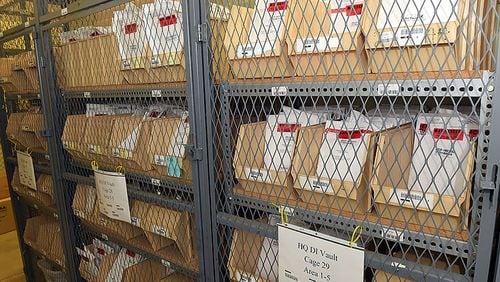The Georgia Bureau of Investigation announced it has completed testing thousands of rape kits that had previously languished for years untested, stalling cases around the state.
The kits contain DNA samples taken from women who told police they had been raped. In all, 3,005 kits were discovered around the state that had never been processed, meaning those cases had never moved forward with law enforcement. The cases ranged from recent to up to 20 years old.
The push to complete testing on the kits has already resulted in multiple arrests and more than 100 active investigations, including 24 “pending arrests,” according to GBI data. At least two serial rapists were also identified by the testing.
The push to test a backlog of kits began after 1,351 untested rape kits were discovered in storage in 2015 at Grady Memorial Hospital. Police had failed to pick them up, and the hospital had kept them, thinking — incorrectly — that federal regulations barred their release. Other kits were "warehoused" and "forgotten about" in evidence rooms at police departments, GBI Director Vernon Keenan said.
It was after an Atlanta Journal-Constitution investigation that legislators in 2016 passed a law making it mandatory for all Georgia law enforcement agencies to gather and send stored rape kits to the GBI for testing. Since then, there have been 321 "hits" on DNA in the kits, giving law enforcement at agencies all around the state critical evidence to bring charges, the GBI said.
“This has been about advancing justice for the victims,” said state Rep. Scott Holcomb, who led the charge for the legislation.
Keenan said the process and Holcomb’s efforts will prevent huge backlogs from accumulating in the future.
“I’ll be speaking across the state of Georgia to law enforcement officials warning them not to allow this to happen again,” Keenan said, adding that the law now requires them to better track untested rape kits they have and to promptly submit them for analysis. “I believe law enforcement has gotten the message.”
The director said he’s heard some of the victims have been grateful to learn their attackers have been identified as a result of the kits, even if after years.
But Keenan and Holcomb were blunt about the damage already done by so many kits sitting forgotten for so long.
“The problem in some of these incidents is time has passed by and the victim is going forward with their life and they do not want to backtrack,” Keenan said. “That is very much a downside for a delay in processing rape kits. A victim wants to continue their life and does not want to relive this 20 years later. This is why it’s so important we never get in (this) situation again.”
Holcomb and the other officials steered clear of criticizing the highly publicized speed bump the legislation hit when it was temporarily blocked in 2016 by state Sen. Renee Unterman, the Buford Republican, who infuriated many by not supporting the bill. Unterman accused Holcomb and other Democrats of politicizing the issue and said the bill wasn't necessary to get the kits tested.
The only mention of that controversy Friday came when House Speaker David Ralston, R-Blue Ridge, vaguely mentioned that the bill was at one point held up for some reason. Instead of slamming Unterman, he praised the House.
“Republicans, Democrats, everyone joined together to right a wrong,” said Ralston, who called the passage of Holcomb’s bill one of the chamber’s finest moments he’d seen. “It gives you a lot of satisfaction to form partnerships with across the aisle.”
The GBI’s next step, now that the kits have been tested and local police have been notified of the hits, is to circle back with law agencies to track how many cases can move forward with arrests or charges.
Data obtained by The Atlanta Journal-Constitution said the GBI is awaiting responses from authorities in DeKalb, Fulton, Gwinnett and Cobb counties, as well as several other jurisdictions.
About the Author







